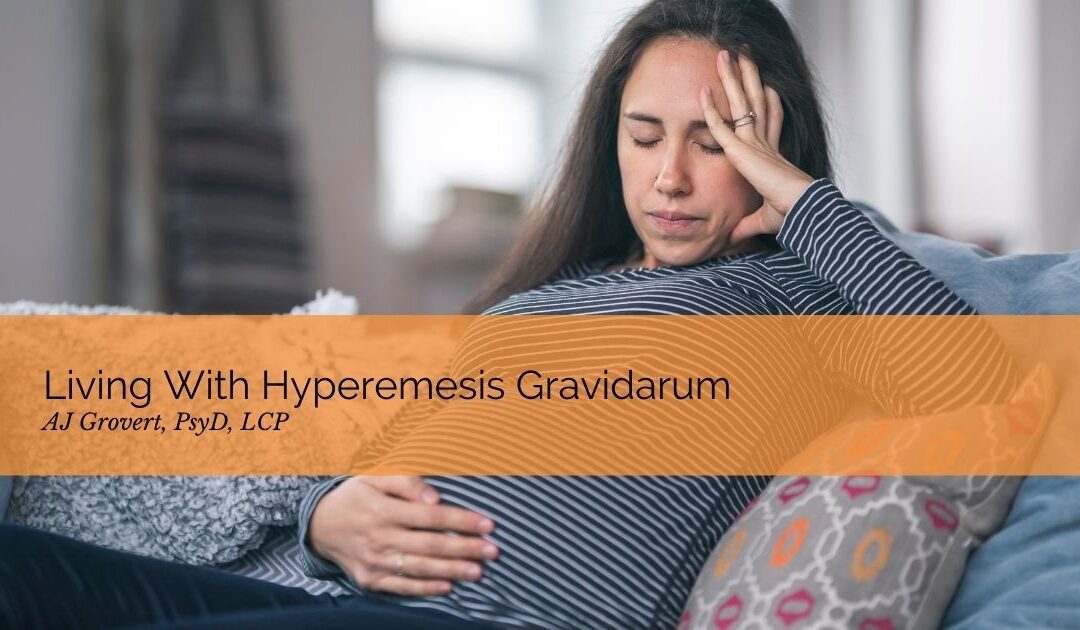I am a clinical psychologist with over a decade of experience treating anxiety, depression, and trauma. One of my focus areas over my career has been the perinatal period, the weeks just before and just after birth. I am also one of the 1-2% of people with hyperemesis gravidarum, or HG, in pregnancy.
 You may have heard of HG when the Duchess of Cambridge, the former Kate Middleton, was hospitalized for the condition with all three of her pregnancies. Or maybe you heard about comedian Amy Schumer, who was hospitalized multiple times with HG during her pregnancy and posted candidly about it on social media. While these two women have brought a lot of awareness to the condition, many still don’t understand the toll HG can take, not just physically but mentally.
You may have heard of HG when the Duchess of Cambridge, the former Kate Middleton, was hospitalized for the condition with all three of her pregnancies. Or maybe you heard about comedian Amy Schumer, who was hospitalized multiple times with HG during her pregnancy and posted candidly about it on social media. While these two women have brought a lot of awareness to the condition, many still don’t understand the toll HG can take, not just physically but mentally.
“Morning sickness,” the misnomer applied to nausea and vomiting of pregnancy, is quite common, occurring in upwards of 70% of pregnancies. It typically fades by the second trimester of pregnancy and varies widely in severity. HG is characterized by severe nausea and vomiting multiple times a day. It can result in significant weight loss, lead to dehydration, interfere with work and family duties, and result in hospitalization to receive vital nutrients and fluids.
 Suffering from HG can be an isolating experience. While many people experience some degree of morning sickness in pregnancy, HG remains relatively rare, which means well-meaning advice, like eating saltines or ginger candies, can be irritating at best. It can feel hard to find people that “get it.” Unfortunately, most home remedies that help with morning sickness don’t touch the symptoms of HG. It can also feel hard to advocate for yourself when feeling so sick and weak, so it’s vital to have a supportive friend or partner who can help. HG can affect family planning – a desire for more children might be outweighed by the desire to avoid suffering from the condition again.
Suffering from HG can be an isolating experience. While many people experience some degree of morning sickness in pregnancy, HG remains relatively rare, which means well-meaning advice, like eating saltines or ginger candies, can be irritating at best. It can feel hard to find people that “get it.” Unfortunately, most home remedies that help with morning sickness don’t touch the symptoms of HG. It can also feel hard to advocate for yourself when feeling so sick and weak, so it’s vital to have a supportive friend or partner who can help. HG can affect family planning – a desire for more children might be outweighed by the desire to avoid suffering from the condition again.
People with HG are more prone to anxiety and depression before and after birth. It’s more important to seek out support during what is already a vulnerable time. HG can complicate feelings about pregnancy and parenthood, and honestly, it’s miserable! I can say from experience, though, that it will get better. Quality medical care and having space to talk about what it feels like are tremendously helpful, whether with supportive friends and family or in a therapy office. Living with HG isn’t something you need to “tough out,” it’s a debilitating medical condition, and support is out there.
Photo Credits:
Photo by Daiga Ellaby on Unsplash
Photo by Dominik Martin on Unsplash


